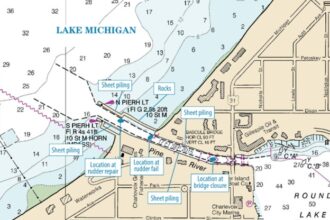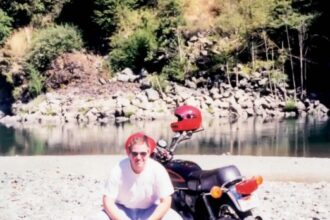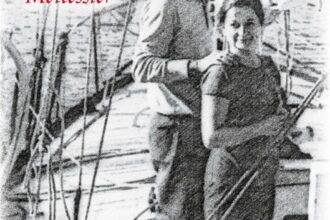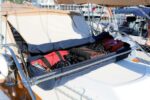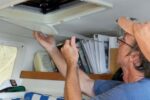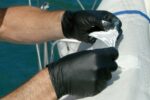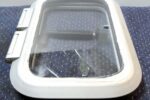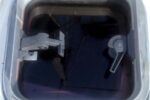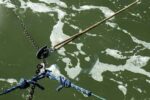New to night passages, a sailor finds help from an unexpected visitor.
Issue 137: March/April 2021
I had stared into the night sky many hundreds of times from the cockpit of my 1967 Rawson 30 Ave Del Mar, but never while sailing on an overnight passage. The Bahamian island of Great Inagua was a manageable 100 nautical miles or so from my anchorage in Crooked Island, but this night felt like a new language.
It wasn’t the first time I had felt this way. Sailing was often a struggle for me. I started late in life and hadn’t even set foot on an underway vessel until my mid-40s. Absent were all those years and lessons that so many sailors have had at the gentle, loving hands of parents and grandparents, absorbing the delicate balance of science and art, thinking and feeling, that is sailing.
Growing up in the Midwest, my lessons had been cars, not boats. At age 10, while the water children were sailing in the club or tacking in a regatta, I was driving a stick shift unsupervised through snow and mud. Those subtleties I understood innately. The boat was a foreign language I had to learn.
And tonight, I realized, I was still learning it. The day’s sail from Crooked Island had gone well, as Ave had settled comfortably in on a mild beam reach making a consistent 4 to 5 knots. I am happy on the open water, and as this day ticked slowly by, I soaked up the sunshine, scanned the horizon for ships, strummed the ukulele, and nibbled away at my food stores without need to wonder what time it was.
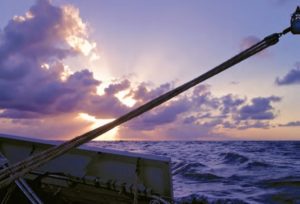
Evening found me sailing through a kaleidoscopic sunset. Hues of magenta and fiery orange came and went, weaving patterns in the sky. It happens so fast. One minute the sun taps the horizon, and the next minute you wonder how its finale could pass so quickly. The grey of evening fell on me, a dusting of nighttime that built too slowly to perceive as it happened.
Night sailing was a very different sensory experience. I found myself comforted by the familiarity of my vessel but also keenly aware that the world had lost the language I knew. Silhouettes on the horizon no longer announced strange ships from afar. Clouds no longer carried messages. The seas no longer danced.
The darkness around me grew into a gentle black and the stars began to come to life—a handful here, a handful there, pushing meekly through the night sky until it became theirs. Ave continued to sail easily, leaving me to my new isolation. I kept watch from the cockpit, catnapping.
I awoke after midnight to an odd scratching sound. A blackbird was clawing a grip onto the edge of the solar panel off Ave Del Mar’s stern rail. I smiled, happy that the universe had sent me some company. I offered food to my new friend who politely refused, choosing instead just to sit clinging to the panel’s square aluminum frame. I decided to name him Mortimer.
For the better part of an hour we carried on as Ave sliced capably through the water. I kept watch and Mortimer observed what he chose to—sometimes curious, sometimes seemingly not. As we crept towards 2 o’clock, he flew off abruptly. The void left by his departure surprised me. Still, I smiled thanks toward the stars and carried on, choosing to be happy with the company I had had.
But the night, the universe, and Mortimer all fooled me. Soon enough my eyes caught movement overhead—and suddenly there he was, my nighttime copilot scratching to a stop like a feathery black Hellcat skidding onto a carrier deck. He white-knuckled the panel’s edge, settled slowly down, and busied himself again with observing.
All night we did this. Mortimer would sit, gripping his perch, and watch me as I sailed. I told him stories, asked him questions that he never answered, and sang him a few songs. From time to time—always without warning—he would fly off, only to return 10 or 15 or 20 minutes later.
Night eventually gave way to the suggestion of dawn. Mortimer left one last time and didn’t return. Ave Del Mar maintained her capable ways. Coffee boiled below in the galley. The daytime world slowly, steadily came back to being. I sailed on, touched by a bird who helped me learn a new language of sailing that I am still only beginning to understand.
John Herlig is a published poet, a public speaker, and host of the upcoming podcast “This is Real Happiness.” He can be found at avedelmar.com.
Thank you to Sailrite Enterprises, Inc., for providing free access to back issues of Good Old Boat through intellectual property rights. Sailrite.com



